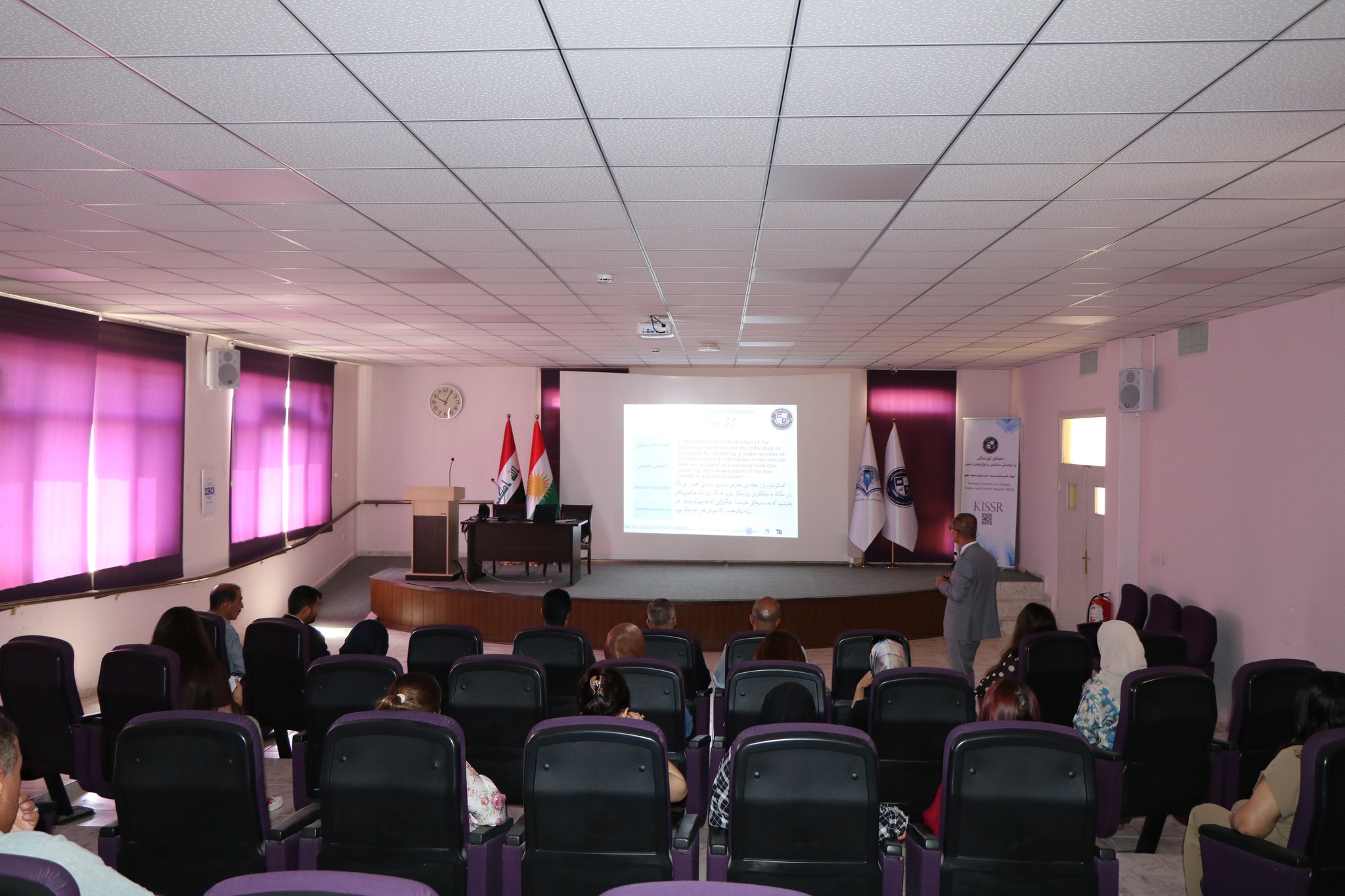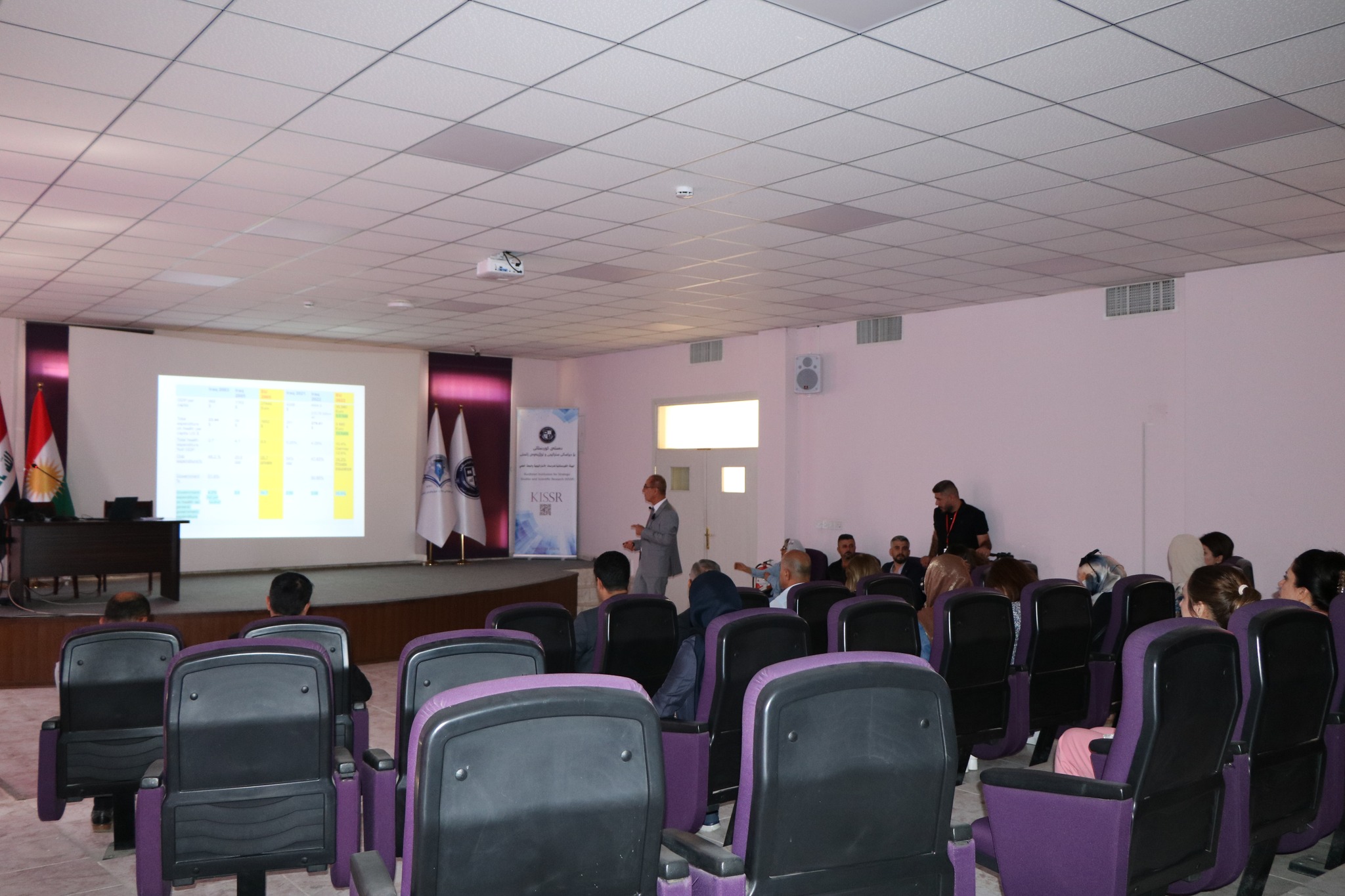Health Insurance in Kurdistan and Iraq

(Summary of a debate held at the Kurdistan Institute for Strategic Studies and Scientific Research-KISSR- on 23/6/2025)
By: Dr. Sarwar Arif, Public Health Specialist
Health is defined by the World Health Organization as " a state of complete physical, mental and social well-being and not merely the absence of disease or infirmity". To achieve good health, we need a good health system, of which health insurance is one of the most important pillars of the modern health system. Health insurance or health assurance is a form of insurance coverage that covers the cost of medical and surgical expenses of each insured individual
The importance of health insurance can be summarized in the following points:
Reduce or eliminate the uncertain risk of harm to the individual or household by combining a larger number of similarly exposed individuals or households included in a common fund that constitutes compensation for the harm suffered by each member. This protects people from the risks of sudden illness and financial health disasters
Prepayment and risk pooling: Individuals or families pay when they are healthy and able to pay. However, when they become ill, insurance funds can be used to finance their health care needs
Health insurance works when there are a large number of enrollees. With a large number, the chances of accidents are reduced and it is easier to spend from the insurance fund
Solidarity: A successful health insurance program requires people to participate, knowing full well that their participation may not help them directly, but it will help others who need the support. In this way, people who are less at risk or who are not sick or have fewer families will help those who are in more difficult circumstances.
Types of health insurance
First, public health insurance covers government employees and certain groups. Second, private health insurance: a limited market, but there is a demand for better services. Third, employer-based: common in large companies; Often partial coverage (part of the requirements)
Financial problems in the health system
Financial resources are limited in Iraq because they are entirely dependent on the budget allocated by the Ministry of Health. In Iraq, for example, about $279.6 per capita will be allocated annually for health (by 2022), about half of which must be paid out of pocket. Compared to 3,685 euros in the European Union. 4.29% of the budget compared to 12.6% in a European country such as Germany (2022).
It is not supported by public participation (except in emergencies), which forces it to reduce the scope of services vertically and horizontally. So public participation is only direct payment when needed, which is incompatible with the modern health system that relies on prepayment
Payment is not fair. Because it is not proportional but the same price regardless of people's financial situation, there is no health insurance, households are exposed to catastrophic financial risks and there is a trend of health trafficking
Official payment by patients in the public sector is sometimes much more than risk sharing (especially when advanced technology is required). For example, some tests or treatments are expensive in the public sector and sometimes force patients into debt and financial disaster
Waste of money and lack of transparency, lack of effective accounting and monitoring systems
Hospital budgets are fixed and depend on input information and data, not output or performance, for example, the number of doctors and staff and their positions, not the number of patients and the treatment and services provided
Lack of guidelines for logical and rational health spending. More resources are constantly needed for health due to rapid demographic growth (estimated to have doubled in 25 years in Iraq).
Recommendations for financial solutions
Increase health financing (budget, allocated taxes on alcohol, cigarettes, premiums (people’s contribution) at least for the formal sector, taxes on the private sector
Establish private and public health insurance companies first at the local level and then at the regional, national and international levels.
Service charges should always be accompanied by exemptions for poor people, certain chronic and serious illnesses or special health interventions depending on age, type of disease, geographical area. Improved public budget management. Transparency in budget information. Change the mechanism of funding by the Ministry of Health to methods such as (contract, purchase of services)
Changes in budget allocations in favor of primary health services that cost less and have greater long-term health effects
Historical Development of Health Insurance
Germany (1883): The world's first national social health insurance system, the Otto von Bismarck Health Insurance Act, was passed in Germany.
United Kingdom (1911): The national health insurance system is established in the United Kingdom, providing primary health care to a select group of people
Japan (1922): The national health insurance system is established in Japan.
After World War II: Health insurance coverage expanded in many countries, including the United States and Europe, where universal health care systems were adopted.
As for the Arab world, the first document written in Arabic to ensure medical treatment appeared in 1957 in Egypt between the United Insurance Company and the Bank of Alexandria. 2005 was the birth of health insurance services in Yemen through specialized health insurance companies
Problems facing health insurance in general:
Lack of full health insurance coverage for all sections of society, the group that is deprived of health insurance, faces the risk of poverty and disease because they have to bear the cost of treatment themselves It also increases the risk of the disease developing among them due to their inability to pay the costs of treatment, which may deprive them of treatment and lead to the spread and worsening of the disease and possibly death.
Increased burden on public or private health insurance funds due to high treatment costs and inadequate funding. or by donating and exempting money from participants, which the Ministry of Social Affairs must do
Increased financial pressure on individuals due to increased deductions from their earnings for health insurance.
The decline in health insurance standards may be due to several factors, including weak health insurance laws and regulations, problems in the administration and implementation of insurance programs.
When insurance has limited impact on improving health care delivery
Lack of transparency, which leads to mis-allocation of funds and poor management of health insurance resources. This could be linked to corruption, which is exacerbated by the lack of an effective monitoring system, legal accountability mechanisms, and appropriate legislation.
Fraud: Creating fraudulent identities and treatments to be covered by insurance laws or treating an uninsured person on a health insurance card, re-charging treatment fees and agreements o receive more money, which puts an additional burden on the insurance fund
Receiving a service that has not been provided, changing the name of the service to be covered by insurance, writing incorrectly about the disease or treatment, changing the time of service, overusing the service, for example natural therapy, excessive hospital stays, unnecessary medication
High claim rate “a large amount of money claimed from insurance.”: If many people are insured and receive a lot of money back from insurance (for treatment, illness, referrals, etc.).
Increasing rates of aging and chronic diseases in society due to increasing age of the population combined with increasing costs of caring for the elderly and the diseases they suffer from, such as diabetes, respiratory diseases, heart diseases. This also increases the pressure on health insurance
adverse selection, sick people enroll in greater numbers than healthy people; Reverse adverse selection, insurance companies typically select low-risk people.
Moral hazard: Insurance changes patient behavior; Frequent doctor visits, requesting more medications and more investigations and treatments
Lack of consumer awareness. Limited knowledge of staff/agents
Insurance companies request appraisals of hospital services. The need for proper communication between healthcare companies and hospitals. Delay in settlement of claims
War, famine and natural disasters lead to an influx of refugees from affected areas into neighboring areas, increasing the pressure on health resources in those areas
The spread of diseases and epidemics due to poor hygiene standards in refugee camps and accommodation also leads to additional financial strain and lack of resources to deal with the situation
How to prevent overuse (overutilization)
Co-payment: Requiring patients to pay a set amount per visit, this measure reduces unnecessary medical visits
Coinsurance: Patients pay a percentage of the cost of treatment out of pocket, preventing overuse of health insurance benefits
Deductibles: Patients pay a portion of their health care expenses before insurance kicks in, promoting awareness
Prior Authorization: Insurers often require approval before covering expensive treatments, verifying medical necessity and preventing overuse
Network Restrictions: Limiting coverage to private health care providers who adhere to ethical treatment practices can help limit unnecessary services
Claim Investigations and Audits: Regular audits help identify and prevent fraudulent claims and excessive patterns
Health Insurance in Iraq:
contribution allowances and coverage rates
Article 27 - 1. Contribution allowances for employees, pensioners, and their counterparts in the private sector, as well as citizens, shall be determined for a lump sum as follows:
F. Higher and special marks, from the Director General and above, and their equivalents in the private sector: 100,000 (one hundred thousand dinars).
b) Public servants in grades one, two and three and their equivalents in the private sector: 50,000 (fifty thousand dinars).
c) Public servants in grades four, five and six and their equivalents in the private sector: 25 thousand (twenty -five thousand dinars).
d) Public servants in other ranks and their equivalents in the private sector: 10,000 (ten thousand dinars).
e) Citizens not covered by paragraphs (a, b, c, d) who are not covered by this law by participating in the amount of (10,000) ten thousand dinars. Second, they are exempt from the participation fee referred to in paragraph (1) of this article.
and - those covered by the social welfare system.
b) Those suffering from the following diseases:
1. Cancer.
2. Mental illness.
3. Hereditary blood diseases.
4. Renal failure treated by dialysis.
5. Physical disability.
6. Mental disabilities, including autism.
(c) Disability of armed and security personnel of all kinds.
D. Males, except employees and pensioners, over 60 years of age.
(e) Females, other than employees and pensioners, over 55 years of age.
F. Children under five years of age.
(g) The Minister and the Head of the Authority may jointly add or delete any case requiring an exception in accordance with paragraphs (2), (b) and (c) of Article 27 of this Law.
Third, the monthly installments of employees, pensioners and their equivalents in the private sector will be determined and included as follows:
F. Senior and special ranks, of general manager and above, and their equivalents in the private sector (2.5%), which is two and a half per cent of the total monthly salary.
b) All public employees and their counterparts in the private sector (1%), one percent of the total monthly salary.
(c) Those referred to in paragraphs (2, b) and (c) of this Article shall be exempt from monthly installments.
d) The Minister and the Authority shall issue instructions to make monthly installments for those not referred to in paragraphs (a) and (b) of paragraph (3, c) of this Article, and determine the monthly installments.
(e) The Council of Ministers shall have the power to amend the rates provided for in this Act upon the recommendation of the Executive Board of the Authority
Final message of our debate:
The introduction of health insurance in Iraq is a good start and encouraging for health reform like the former Soviet Union from the public health system to a health insurance system like developed countries, is a good begining, although it may need more changes and support.
We hope it will be successful and will cover the whole of Iraq, including the Kurdistan Region. It should be the beginning of a serious reform of the Iraqi health system towards a modern system where citizens are safe and no longer worry about their health problems.




